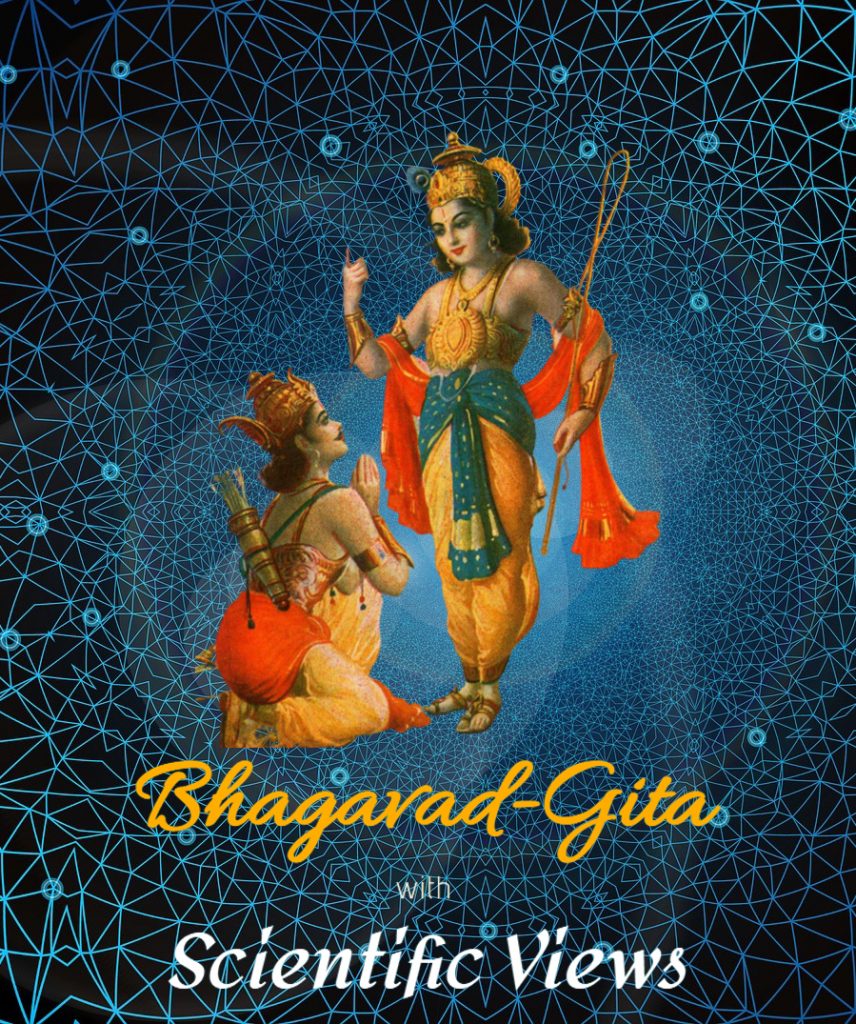Course Syllabus
Session 1
- Introduction to Bhagavad-Gita
- Chapter 1: Arjuna’s Reasons to avoid fight
- Chapter 2: Soul is Eternal
- Chapter 3: Karma Yoga
- Questions & Answers
Introduction to Bhagavad-Gita
- Bhagavad-Gita – Manual of Life and Universe
- How to learn Bhagavad-Gita
- Definition of God
- Essence of all Upanishads and Vedas
Chapter 1: Arjuna’s Reasons to avoid fight
- With whom shall we share happiness?
- Why should I kill, even if they kill me? (Compassion)
- Sinful to kill aggressors
- Unprotected Family leads to irreligion
- Unwanted progeny create hellish life
- Social and family welfare checked
- Should not commit sin for royal happiness
- Arjuna declines to fight with compassionate grief
Chapter 2: Soul is Eternal
- Arjuna accepts Krishna as Guru
- Sankhya Yoga
- Buddhi Yoga
- Table of Arjuna’s doubts and Krishna’s answers
Chapter 3: Karma Yoga
- Two classes of Intelligent – Jnana yogi & Karma yogi
- Karma Yoga
- Why do we commit sin?
Questions and Answers discussion
Session 2
- Chapter 4: Transcendental Knowledge
- Chapter 5: Karma Yoga ++
- Chapter 6: Dhyana Yoga
- Questions & Answers
Chapter 4: Transcendental Knowledge
- Parampara for Transcendental Knowledge
- Krishna is Transcendental
- Knowledge of Krishna is Transcendental i.e. liberating
- Service to Krishna is transcendental (akarma) i.e. liberating
- All kinds of sacrifices lead to Transcendental knowledge in due course of time
- Work in Yoga with renunciation does not bind, therefore, fight
- Shraddha -> Transcendental Knowledge -> Akarma -> Peace
Chapter 5: Karma Yoga ++
- Which is better, working or renouncing?
- Various Sannyasis
- Sin does not touch work for Krishna
- Secret of success – keep going
- Peace principle
- Real Sannyas -> working for Krishna without selfish motives
Chapter 6: Dhyana Yoga
- Yogi, Advanced Yogi & Best Yogi
- Three phases of meditation
- Arjuna says meditation is difficult and not possible
- Examples
- Yogi is better than tapasvi, jnani, and karmi
Questions and Answers discussion
Session 3
- Chapter 7: How to remember God always
- Chapter 8: Supreme Destination
- Chapter 9: Raja Vidya
- Questions & Answers
Chapter 7: How to remember God always
- Learn to remember Krishna
- Controller of material elements & worlds
- Controller of three modes of material energy
- Controller of demigods and Brahman
- One who knows Krishna as controller of material worlds, demigods, sacrifices, he/she will also know the same at the time of death
Chapter 8: Supreme Destination
- Different paths to remember God at end of Life
- Arjuna’s questions
- Bhakti is sure path for liberation
Chapter 9: Raja Vidya
- Become my devotee
Questions and Answers discussion
Session 4
- Chapter 10: Excellence of Krishna
- Chapter 11: Demonstration of Chapter-10
- Chapter 12: Bhakti Yoga devotional service
- Questions & Answers
Chapter 10: Excellence of Krishna
- Krishna gives further knowledge of Supreme Person, i.e. Himself
- Krishna is the source of all excellences
- Details of how Lord pervades this universe
Chapter 11: Demonstration of Chapter 10
Chapter 12: Bhakti Yoga – devotional service
- Who is better? Devotee or Impersonalist
- Scientific Insights
Questions and Answers discussion
Session 5
- Intertextuality of the Hindu Texts
- Questions & Answers
Intertextuality of Hindu Texts
- Avatara – Incarnation
- Vyasadeva – The Literary Incarnation
- Necessity of recording
- Guiding Light for the people of Kaliyuga
Questions and Answers discussion
Session 6
- Chapter 13: What is Prakriti, Purusha, Kshetra, Kshetrajna, Jnanam & Jneyam
- Chapter 14: Modes of Material Nature
- Chapter 15: Purushottama Yoga
- Questions & Answers
Chapter 13: What is Prakriti, Purusha, Kshetra, Kshetrajna, Jnanam & Jneyam
- Prakriti, Purusha, Kshetra, Kshetrajna, Jnanam & Jneyam
- Knowledge – a definition by enumeration
- Paramatma
- True seer
- Brahman
- Purusha (soul)
- One who knows kshetra – kshetrajna, can understand and attain liberation.
Chapter 14: Modes of Material Nature
- Mahad Brahma -> Pradhana -> Prakriti -> Mahat Tattva
- Mahat Tattva and 24 elements
- Pradhana includes 3 Modes
- Natures and Characteristics of 3 Modes
- 3 Modes & Next life
- 3 Modes of actions & their result
- One who can see Modes are at action, can understand Supreme Lord
- One who transcends modes, tastes nectar
- Symptoms of one who is beyond modes
- How to transcend – Bhakti
- Bhakti -> Brahman stage -> Ultimate happiness because Krishna is the basis of Brahman.
Chapter 15: Purushottama Yoga
- Inverted Tree
- Detachment & Attachment
- Supreme Abode
- Most Confidential gyan of Vedas
Questions and Answers discussion
Session 7
- Chapter 16: Divine and Demoniac Qualities
- Chapter 17: Divisions of Faith
- Chapter 18: Conclusion & Summary
- Questions & Answers
Chapter 16: Divine and Demoniac Qualities
- Divine Qualities
- Demoniac Qualities
- Follow Scriptures
Chapter 17: Divisions of Faith
- Which mode do they worship according to their own whims?
- Faith according to three modes of living.
Chapter 18: Conclusion & Summary
- Perfection of renunciation
- Renunciation (tyaga) vs Renounced order of life (sannyas)
- Ultimate duty – Surrender to Krishna
- Gita Practice in Modern age
- Scientific Sankirtan

